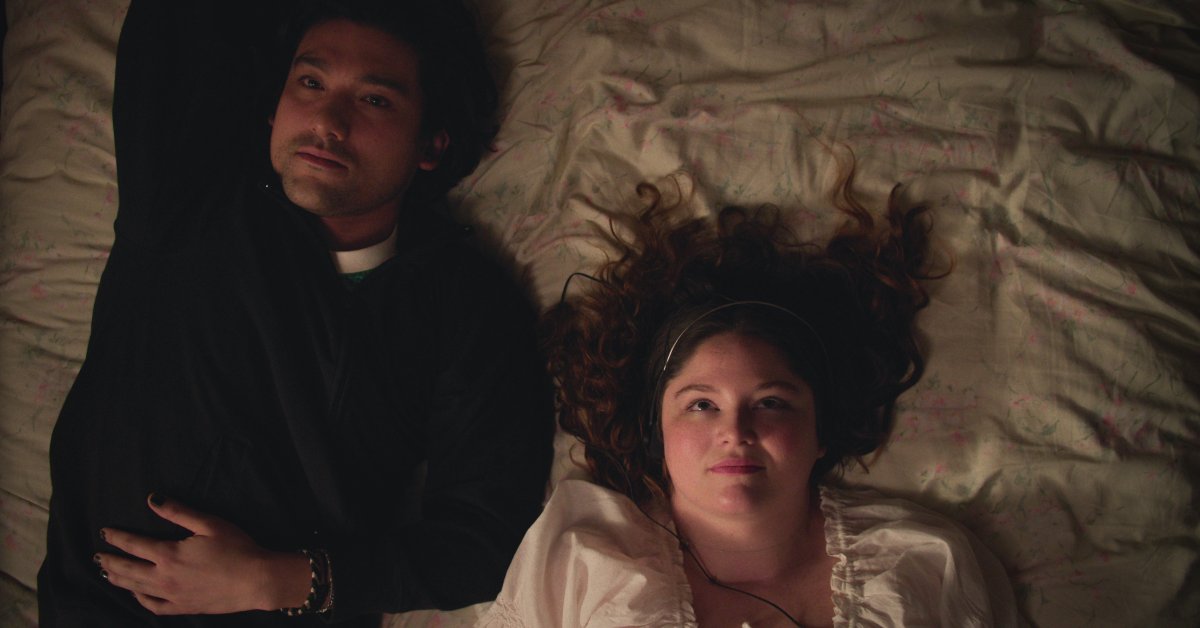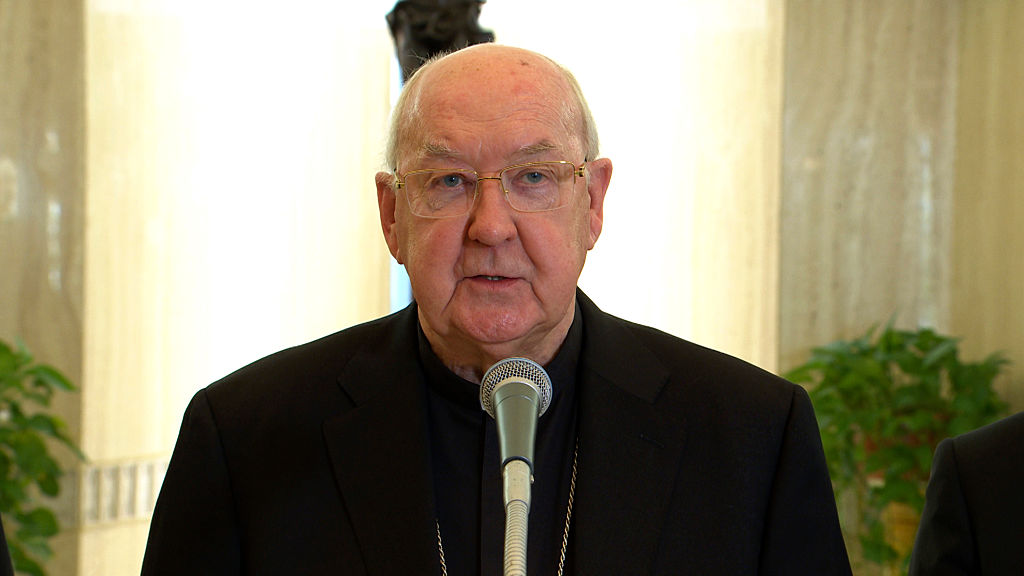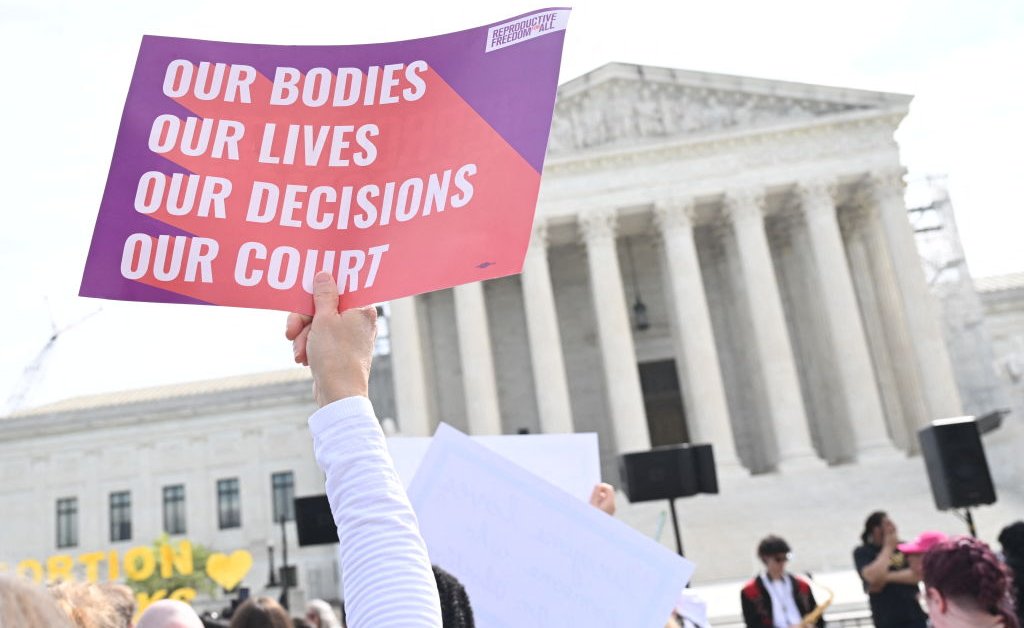According to the digital clock on Jessica’s bedside table, it’s just after 9:07 p.m. on a weekday evening when she issues a warning to Felix: “I can’t stay up late tonight.” Jess (Megan Stalter) has an important meeting at 8:30 the next morning. And the new couple, whose romance is chronicled in the Netflix series Too Much, has gotten into the habit of lingering together through the wee hours, to the extent that her new boss (Richard E. Grant) has noticed her struggling at work. But the first flush of love is a potent force. In the third—and, in my estimation, best—episode of the season, we watch it overpower our heroine’s more prudent impulses.
A genre-savvy, meta romantic comedy in the tradition of Emily Henry’s novels and the best of Nora Ephron, Too Much, from co-creators Lena Dunham and Luis Felber, visualizes Jess’ Wuthering Heights fantasies and features a scene in which her family dissects Alan Rickman’s sex appeal in Sense and Sensibility. Each episode’s title is a spin on the name of a classic silver-screen romance. That this particular chapter of Jess and Felix’s (Will Sharpe) love story is called “Ignore Sunrise”—a reference to Richard Linklater’s gorgeous indie touchstone Before Sunrise, released in 1995—serves as the first clue that it’s doing something special.
Read more: Megan Stalter Is Reinventing the Rom-Com Heroine
The first feature in what would become a trilogy spanning two decades, Before Sunrise follows two devastatingly attractive, 20-something strangers, Ethan Hawke’s Jesse and Julie Delpy’s Céline, who meet on a train and, after an electric first chat, decide to disembark together in Vienna. He’s an aimless, idealistic American; she’s a blunter, more skeptical Frenchwoman studying at the Sorbonne. Jesse has a plane to catch the next morning but can’t afford a hotel room, so they wander the cobblestone streets and haunt cafes, falling hard for each other as afternoon fades into evening and night yields to, yes, sunrise. Though the liaison is eventually consummated, it’s the conversation between Céline and Jesse that kindles their love. With disarming honesty, they discuss philosophy, art, and memory, filtering their ideas through personal anecdotes as they grow more connected with each searching exchange. When they separate, less than 24 hours after meeting and with only the vaguest reunion plans, it’s unclear whether these two lovers, who seem so perfectly matched, will ever see each other again.
Though it’s situated within the arc of a longer, in some ways more conventional romance, “Ignore Sunrise” pays tribute to Linklater’s film by pausing the show’s plot to luxuriate in what becomes, despite Jess’ intentions, a sleepless night. (It also reminded me of the standout Girls episode “One Man’s Trash,” which unfolds over the course of a weekend-long fling between Dunham’s Hannah and an older man played by Patrick Wilson.) Periodic shots of the digital clock punctuate the passing of time—11:02, 1:11, 2:36, 4:03, 5:07—as she and Felix move from room to room in her shabby sublet. He makes pho in the kitchen, and they make out on the floor. They watch Paddington, one of his favorite movies, in the living room and hook up on the couch. In the bedroom they banter about her habit of falling asleep to true crime documentaries (“Murder is relaxing to you?” he marvels). They can’t even keep their hands off each other in the bathroom, while she’s brushing her teeth. The episode ends with the buzz of the alarm at 6:45 a.m., as Jess shovels cold pho into her mouth in preparation for another exhausted workday.
Like Jesse and Céline, Jess and Felix are, respectively, an American abroad and an old soul from across the Atlantic. (Might Jess’ name be a callback to Hawke’s character? Totally possible I’m overthinking this.) And their conversations are similarly revealing. “Isn’t adulthood just a series of things we don’t want to do but we have to?” Jess asks as she pores over a budget document, working after hours to prove she’s a valuable employee. “No,” replies Felix, who’s struggling to support himself as a session musician and has just come from a frustrating visit to the employment office. “I think it’s, like, trying to make sure you can do the things you actually want to do.” When he asks if what she’s working on is what she always wanted to do with her life, she hedges: “It’s similar to what I really wanted to do.” We see how she could use a dose of his idealism about creative pursuits, just as he could stand to absorb some of her work ethic.
They delve into their pasts. There are flashbacks to Jess’ childhood with a father she adored, who died young of an aggressive form of Parkinson’s. Now three years sober, Felix tells her about his “rock bottom” and the realization that the substance abuse that was part of his rock ‘n’ roll lifestyle was actually keeping him from writing good music. His insights into who she is can be breathtaking. He likens Jess, who traveled to London with a broken heart, to the orphaned Paddington, wandering through the city with an invisible tag that reads: “Please look after this girl.” He observes, “You’re not always that kind to yourself,” undervaluing her own comfort.
But “Ignore Sunrise” does diverge from Before Sunrise in ways that feel crucial to the more honest, self-aware romance Dunham and Felber seem intent on creating in Too Much. There is a sheen of poetic perfection to the film; Jesse and Céline are idealized lovers who look like grunge-era fashion models and speak with an unguarded openness. Jess and Felix, by contrast, are real, funny, messy, horny, flawed people. (“I’ve always actually felt really hot,” she says at one point, debriefing after an abortive attempt at their umpteenth sexual encounter of the night. “Except for when I haven’t”—an inevitability, she explains, in a society that lets every woman who isn’t supermodel material know it.) They’re frank about their bodies: “I have to go to the bathroom,” she says after sex, “because I’m not about that UTI life.” Grossing each other out is part of their love language. “There was one time I went on a bender and had sex with my sister…’s friend,” Felix says, teasing Jess with a long pause that implies he committed incest.
Dunham, who wrote and directed the episode, also seeds their interactions with the distractions, evasions, and half-truths of two people with baggage who aren’t yet comfortable baring their whole souls. Dating Felix hasn’t stopped Jess from obsessing over her ex, Zev (Michael Zegen), and his new fiancée, Wendy (Emily Ratajkowski). She sneaks glances at their social media and flashes back to nights in bed with Zev. One fantasy sequence imagines Jess and Wendy bonding at a Grease-style sleepover, then seducing each other in a red-lit erotic thriller. Even in the middle of an idyllic night with her new boyfriend, Jess is too stuck in her recent past to be entirely present. Because Too Much is filtered mostly through her perspective, it will take some time for viewers to discover everything that’s competing with Jess for Felix’s attention—though in one telling moment, she asks him about his family and he ever-so-gently changes the subject.
There’s an irony to “Ignore Sunrise,” too. Felix is perceptive enough to notice that Jess is too quick to discount her own comfort. But he doesn’t seem to notice, as he stays in bed to enjoy the daytime sleep of the underemployed while she gets up to prepare for her meeting, that this night, as wonderful as it was, is another example of that self-sacrificing tendency. One about which he should, perhaps, be aware and concerned enough not to become complicit. There’s a fine line between compatibility and codependency, having compassion for another person’s failings and enabling them. The episode’s uneasy conclusion foreshadows the many obstacles, habits, and hangups the couple must tackle on the road to long-term happiness—something Linklater’s movie never has to consider (though its equally superb sequels do, in great depth).
If Before Sunrise updated the high romance of fairy tales for the ’90s bohemian, then Too Much is grounded in real-life relationships (Dunham and Felber’s, for one), disrupted as they are by UTIs and family trauma and intrusive thoughts of heartbreaks past. Yet the movie’s influence on the show is wonderfully apparent in the core theme they share—a conviction that the effort to communicate across the yawning void that separates individual consciousnesses is the ultimate act of love. “If there’s any kind of magic in this world,” Céline, the realist, proposes to Jesse, “it must be in the attempt of understanding someone sharing something.” It’s an observation you can imagine Jess and Felix mulling, too, alone together in the fragile quiet before sunrise.








